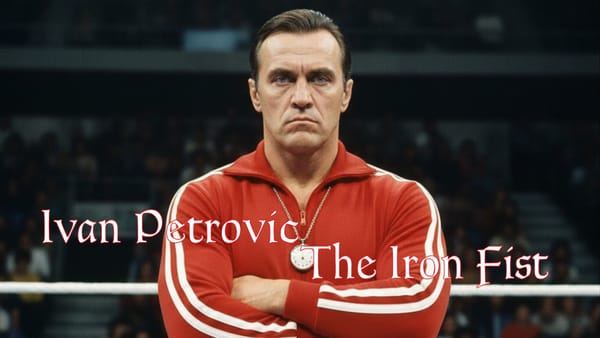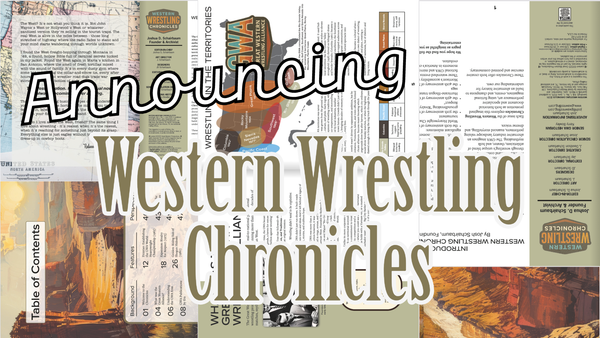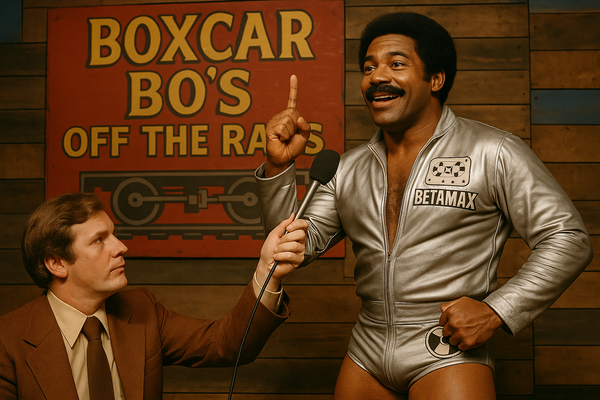Reflections on Soul Power (1982)
In this special edition of the Grapple Gazette, we celebrate the 10th anniversary of Soul Power Olympic Brawl. Enjoy vivid storytelling and fantasy-inspired artwork that honor the iconic wrestlers and unforgettable moments of that historic night.

Introduction
Welcome to a night etched in the annals of wrestling history, where the echoes of soul music and the raw power of the ring converged in a symphony of spectacle. On August 20, 1972, the Grand Olympic Auditorium in Los Angeles became a battleground for heroes and a stage for legends. This was the Soul Power Olympic Brawl, an event that transcended the boundaries of sports entertainment and wove itself into the very fabric of cultural heritage.
The atmosphere crackled with anticipation as fans from all walks of life gathered, their hearts pounding in unison with the soulful rhythms that filled the air. This was a night where wrestling titans clashed not just for glory but for a deeper sense of purpose and pride. Guided by the unparalleled voice of Buck "Sagebrush" Thompson, the event promised to be a fusion of tradition, artistry, and unyielding spirit. From the explosive opening bout to the climactic main event, each match was a chapter in a larger story of resilience, rivalry, and triumph.
As we journey back to that unforgettable night, we celebrate the moments that defined an era, the personalities that captivated millions, and the legacy that continues to inspire. The Soul Power Olympic Brawl was more than just an event; it was a testament to the enduring power of wrestling to unite, entertain, and transcend. Join us as we delve into the magic and the mayhem, the heroes and the heartbreaks that made this night a cornerstone of the Great Western Wrestling Alliance.
The Setting of the Soul Power Olympic Brawl
The Grand Olympic Auditorium in Los Angeles transformed into a scintillating nexus of music, culture, and wrestling on the unforgettable night of the Soul Power Olympic Brawl. The storied venue, steeped in a rich tapestry of sporting history, metamorphosed into a throbbing arena where the reverberations of Wattstax pulsated through its hallowed halls. An electric ambiance permeated the air, charged with the soulful cadences of the era as music and wrestling intertwined to forge a singular, mesmerizing spectacle.
As fans crossed the threshold, they found themselves enveloped by the infectious energy of live performances and classic tracks, meticulously curated to resonate with the evening's spirit. The stage, adorned with vivid banners and illuminated by flashing lights, cast a prismatic array of colors over the eager throng. Each beat of the music synchronized seamlessly with the mounting anticipation, weaving an auditory and visual tapestry that elevated the collective sense of excitement to dizzying heights.
Buck "Sagebrush" Thompson, the esteemed voice of the GWA, played an instrumental role in sculpting the evening's ambiance. His rich, resonant commentary, peppered with colorful Texan colloquialisms and evocative storytelling, imbued the matches with vibrant life uniquely his own. Sagebrush's influence transcended the microphone as he deftly orchestrated the musical backdrop that defined the night. Songs like Aphrodite's Child's "Four Horsemen" and The Isley Brothers' "It's Your Thing" became narrative devices, amplifying the wrestlers' personas and setting the stage for their epic clashes.
Thompson's discerning ear for music and profound grasp of the cultural zeitgeist ensured that each bout was not merely a contest of strength and skill but a dynamic, multifaceted performance art piece. The seamless fusion of music and wrestling under his masterful guidance birthed an experience both immersive and transcendent, searing an indelible mark on the collective consciousness of all in attendance. The Soul Power Olympic Brawl, through Sagebrush's visionary curation, etched itself as a seminal moment in the annals of wrestling history, a testament to the power of artful synthesis and the enduring magic of a truly unforgettable spectacle.
Interview with Buck "Sagebrush" Thompson
Interviewer: Buck, looking back, how did announcing at the Soul Power Olympic Brawl stand out from other events you’ve covered, and what was the atmosphere like that night?
Buck "Sagebrush" Thompson: Well, lemme tell ya, partner, announcin' at the Soul Power Olympic Brawl was like ridin' a wild stallion through wildfire—fiery and unforgettable. The whole night had a vibe I ain’t felt before or since. You could feel the soul of the music festival still lingering in the air, mixin' with the raw energy of the GWA. It was such a fusion of cultures and passions. The crowd was buzzin' with anticipation, and every cheer, every gasp, was music to my ears. When you got folks from all walks of life gatherin' under one roof, united by their love for the sport and the beat of the music, it creates a magic that's hard to put into words. The atmosphere? Well, it was thicker than molasses on a cold Panhandle morning—rich, sweet, and full of flavor.
Interviewer: Your influence on the musical selections for that night was significant. How do you feel music played a role in the overall experience and the matches themselves?
Buck "Sagebrush" Thompson: Ah, music and wrestlin'—two sides of the same coin, if you ask me. Music sets the tone, gets the blood pumpin', and tells a story all on its own. For Soul Power, we wanted tunes that captured the spirit of the times and characters, that soul and funk that just gets under your skin and makes you move. When "Papa Was A Rollin Stone" hit for Viper Vic, or when Harlem Hurricane strutted out to "It's Your Thing," it wasn't just background noise. It was the soundtrack to their battle, the rhythm to their fightin' spirit. Music gave each match its own heartbeat and identity. It turned entrances into grand parades and victories into triumphant spectacles. Heck, even the low notes, the moments of struggle, had their own symphony. That night, the music was the unsung hero, amplifying every slam, every cheer, and every heartbreak. We were goin' for connectin', and boy, did we strike a chord with that crowd.
Opening Match: "The Viper" Vic Steele vs. "Big Sky" Billy Thompson
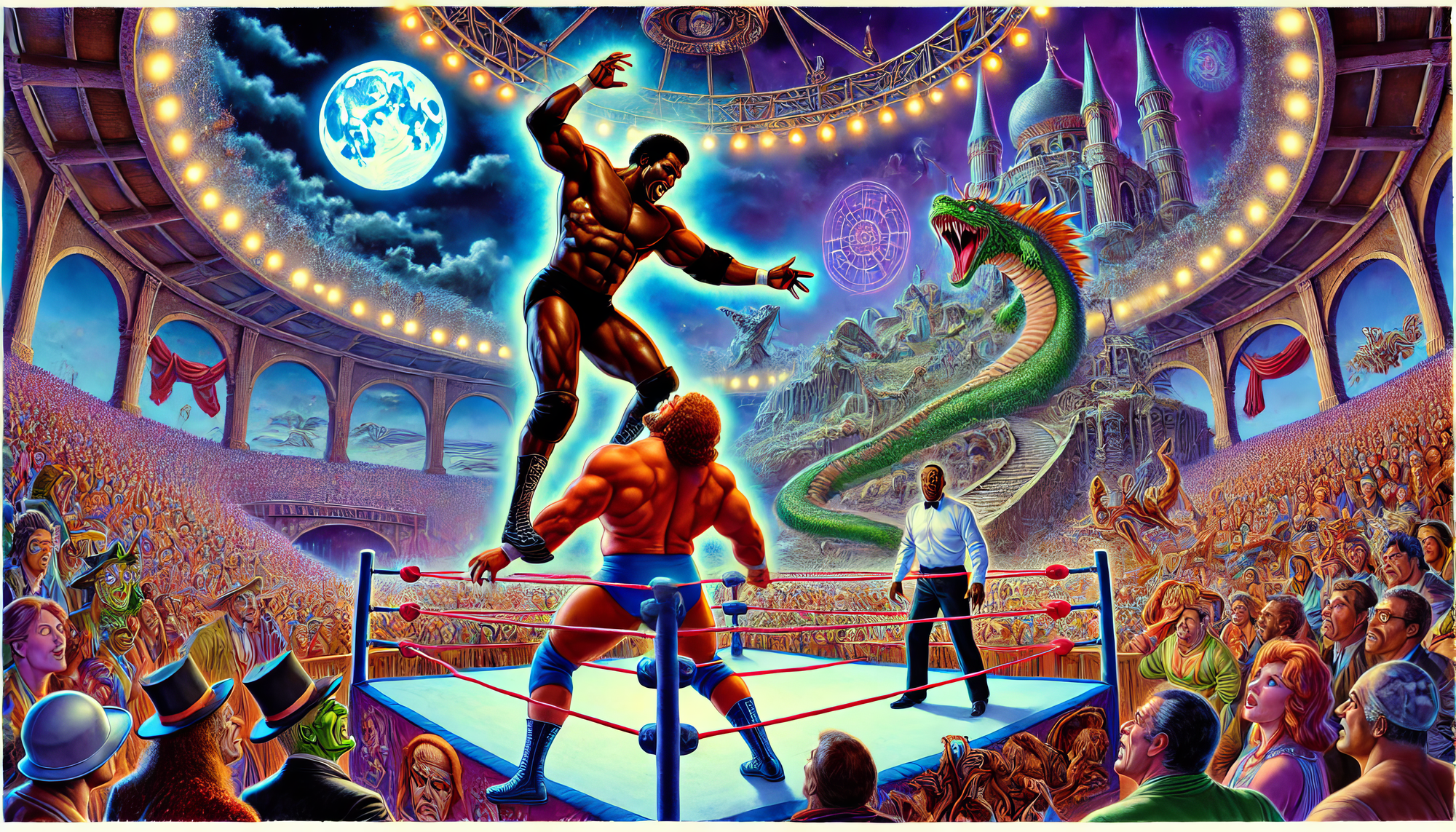
As the velvet curtain of dusk descended upon Los Angeles, the Grand Olympic Auditorium crackled with electric anticipation, the air heavy with the promise of an epochal clash. The opening match of the Soul Power Olympic Brawl, a titanic battle between two indomitable forces, loomed on the horizon, poised to change what was to be etched into the annals of GWA lore.
"The Viper" Vic Steele, a name that struck terror into the hearts of even the most battle-hardened competitors, emerged from the shadows, his presence an amalgamation of magnetic charisma and palpable menace. His adversary, "Big Sky" Billy Thompson, a towering paragon of all-American valor, stood resolute, an immovable bastion against the gathering storm. The stark dichotomy between Steele's calculated malevolence and Thompson's unwavering integrity set the stage for a dramatic tableau, a morality play writ large upon the canvas of the squared circle.
As the bell tolled, the combatants engaged in a dance of power and guile, their movements a symphony of violence and grace. Steele, a master of his craft, unleashed a relentless onslaught, his every action a calculated strike designed to exploit the chinks in Thompson's armor. With surgical precision, he targeted his opponent's vulnerabilities, a sadistic architect constructing a monument to his own twisted brilliance.
Yet, in the face of Steele's unrelenting assault, Thompson's indomitable spirit shone like a beacon, a lighthouse standing fast against the tempestuous sea. The crowd, stirred by his unyielding resilience, rallied behind their hero, their impassioned chants of "Billy! Billy!" reverberating through the hallowed halls, a clarion call to arms in the face of impending doom.
As the tides of battle began to turn, an astonishing metamorphosis unfolded before the eyes of the enraptured audience. The Viper was a native of Los Angeles, and had grown up in the shadows of the Coliseum. The chants, once a paean to Thompson's valor, began to shift, the tectonic plates of allegiance realigning beneath their feet. "Viper! Viper!" they cried, their voices a reluctant tribute to Steele's undeniable prowess. In that moment of transformation, as the line between hero and villain blurred, the true essence of professional wrestling was laid bare, a spectacle as mercurial as it was mesmerizing.
The denouement of this epic struggle saw Steele's hand raised in triumph, a testament to his indomitable will and the harbinger of his impending ascendancy within the GWA. The opening match of the Soul Power Olympic Brawl, a clash of titans that would echo through the ages, had come to a close, but its impact would endure, a timeless reminder of the power of storytelling and the magic of the squared circle.
Interview with Vic "The Viper" Steele
Interviewer: How did you feel when the crowd's chants shifted in your favor during the match?
Vic Steele: Man, let me tell you, that night was somethin' else. When I stepped into that ring, I knew folks weren't exactly on my side. I was used to bein' the bad guy, the one everyone loved to hate. But as the match went on, somethin' shifted. Hearin' those chants turn from "Billy! Billy!" to "Viper! Viper!"—it hit me deep. It was like the crowd saw past all the ruthless tactics and saw the fighter in me, the one who never backs down. It was a moment of recognition, like they finally understood my struggle and respected the grind. That noise, that energy—it fueled me like nothin' else. It was the start of a new chapter, a sign that maybe, just maybe, I could be more than just the villain.
Interviewer: What do you think was the turning point that led to your victory?
Vic Steele: The turning point? That came when I realized I had somethin' to prove not just to them, but to myself. Big Sky Billy was tough, no doubt about it, but I had somethin' he didn't—years of grit and determination from fightin' my way up. When he threw me into that corner and I felt the sting of that impact, I knew I had to dig deep. That's when I found that extra gear, that inner strength. I caught him mid-air and slammed him down with a powerslam that echoed through the arena. In that moment, it wasn't about bein' a good guy or a bad guy; it was about survivin' and thrivin'. The crowd felt it, I felt it, and from there, the momentum was mine. I embraced the struggle, turned it into strength, and that's how I came out on top. Strength through struggle, victory through valor—that's the code I live by now.
Second Match: "El Águila" Pedro Ramirez vs. "Raging Bull" Marco Valdez
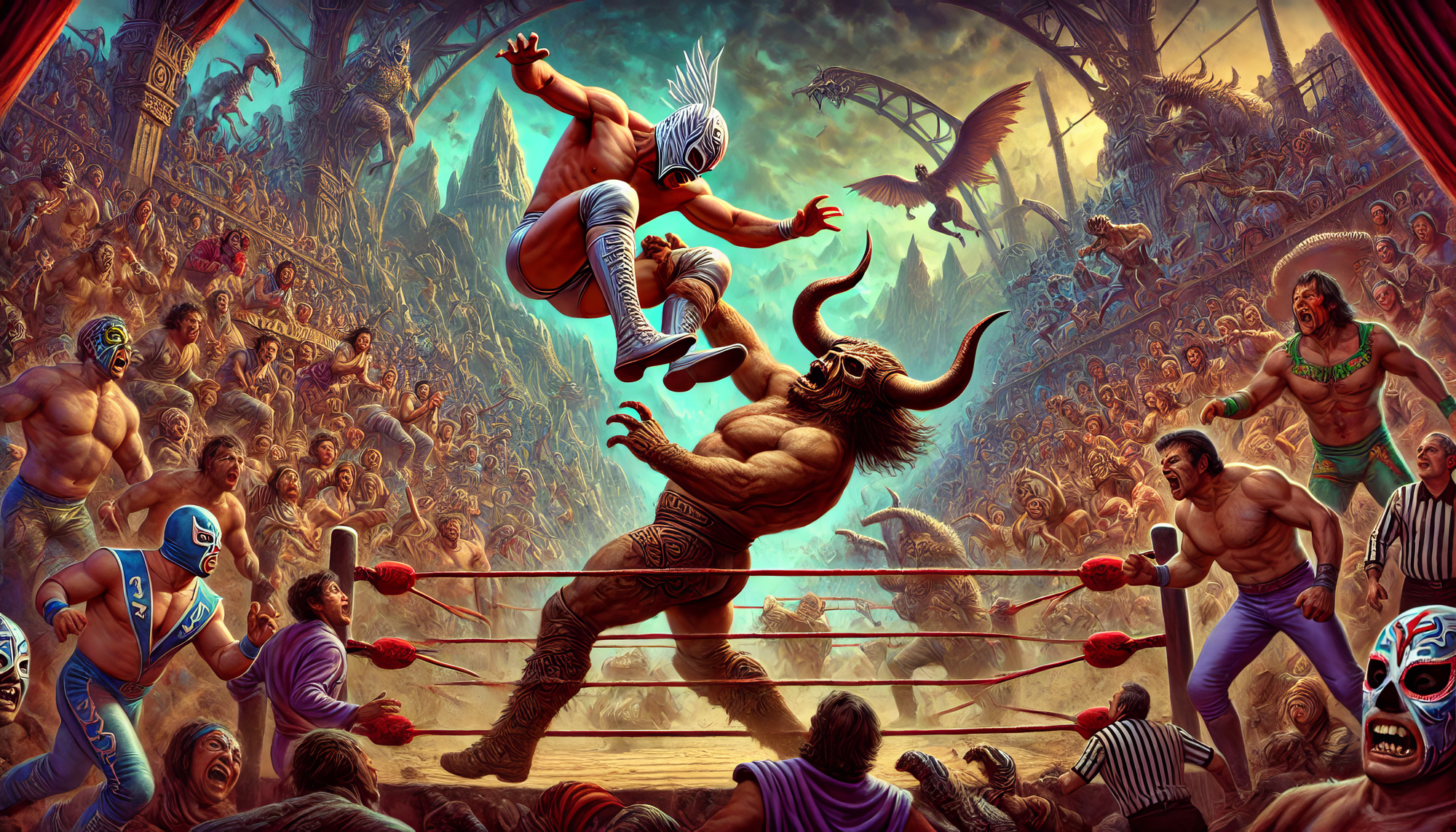
The second match of the Soul Power Olympic Brawl wove a resplendent tapestry of cultural heritage and unbridled passion, a testament to the transformative power of lucha libre and the indomitable spirit of its practitioners. "El Águila" Pedro Ramirez, a high-flying virtuoso whose very name evoked the soaring majesty of the eagle, emerged to the intoxicating strains of Richie Valens' "La Bamba," an homage to his deceased uncle, GWA legend Miguel "Rio Grande" Ramirez. His entrance was a spectacle unto itself, a whirlwind of acrobatic feats that left the audience spellbound, their collective breath caught in their throats as they bore witness to the living embodiment of aerial artistry.
Standing across the ring, an immovable object to Ramirez's unstoppable force, was "Raging Bull" Marco Valdez, a titan whose presence was as imposing as the horned luchador mask that obscured his features. Valdez's entrance, accompanied by the hauntingly evocative "The Four Horsemen" by Aphrodite's Child, was a study in barely contained fury, a promise of the primal power that would soon be unleashed upon the canvas. The stage was set for a clash of opposites, a battle between the soaring eagle and the rampaging bull, each a master of their craft, each driven by an unquenchable thirst for glory.
As the bell sounded, the differences between the two combatants were thrown into stark relief. Ramirez, possessing the lithe grace of a jungle cat, executed a dizzying array of breathtaking maneuvers, his body a blur of motion as he launched himself through the air with reckless abandon. The pinnacle of his aerial assault came in the form of a suicide dive, a death-defying leap that sent him hurtling through the ropes, a human projectile aimed squarely at the heart of his opponent. The crowd, electrified by this display of raw courage, erupted in a symphonic cacophony of awe and exhilaration, their voices rising to the rafters in a collective roar of approval.
Valdez, a mountain of a man, weathered the storm of Ramirez's offense, his implacable resolve unshaken by the maelstrom that swirled around him. With the inexorable strength of a force of nature, he seized the high-flyer mid-flight, catching him like a rag doll and slamming him to the mat with a powerslam that shook the very foundations of the arena. The ebb and flow of dominance between the two gladiators was a mesmerizing sight, a chess match played out in blood and sweat, each move a calculated gambit in a game of human drama.
The climax of this epic struggle unfolded outside the ring, a fitting stage for the larger-than-life personas that inhabited it. Valdez, his senses clouded by the red mist of frustration, found himself on the receiving end of a dropkick that sent him careening into the unforgiving embrace of the barricade. Dazed and disoriented, he failed to beat the referee's inexorable count, the final bell tolling like a death knell as Ramirez's hand was raised in triumph.
Yet, even in defeat, Valdez's legend grew, his indomitable spirit a shining example of the depths of passion that lucha libre could evoke. The match, a masterpiece of emotional storytelling and physical prowess, cemented the status of both men as icons of their craft, their names forever etched in the annals of wrestling history. The Soul Power Olympic Brawl had borne witness to a clash of titans, a battle that would endure as a testament to the power of the human spirit and the timeless magic of the squared circle.
Interview with Marco Valdez
Interviewer: How did the intensity of the match compare to your previous encounters with Ramirez?
Marco Valdez: The intensity was off the charts. Pedro Ramirez has always been a formidable opponent, but that night, it felt like we were battling for our very souls. Every move, every strike was more brutal, more ferocious. But remember this, "El toro siempre carga hacia adelante." The Raging Bull does not back down. Ramirez pushed me to my limits, but I thrived on that chaos. It was a war, and in war, I am relentless. The ferocity of that match was unmatched, and it fueled my rage and determination.
Interviewer: Can you describe the atmosphere in the arena from your perspective?
Marco Valdez: The arena was like a cauldron, bubbling over with anticipation and raw energy. The fans, they roared with every clash, every slam. But I could feel their fear, their excitement. It fed my fire. "Prepárate para el dolor," I could see it in their eyes. They knew pain was coming, and they reveled in it. The lights, the noise, it was all a blur, but one thing was clear: in that ring, I am imparable. The atmosphere was electric, charged with the tension of a thousand souls waiting for the storm to hit. And I was that storm, ready to unleash my fury on anyone who dared to stand before me.
Third Match: "Southern Belle" Emily Beaumont vs. Lisa "Action" Jackson
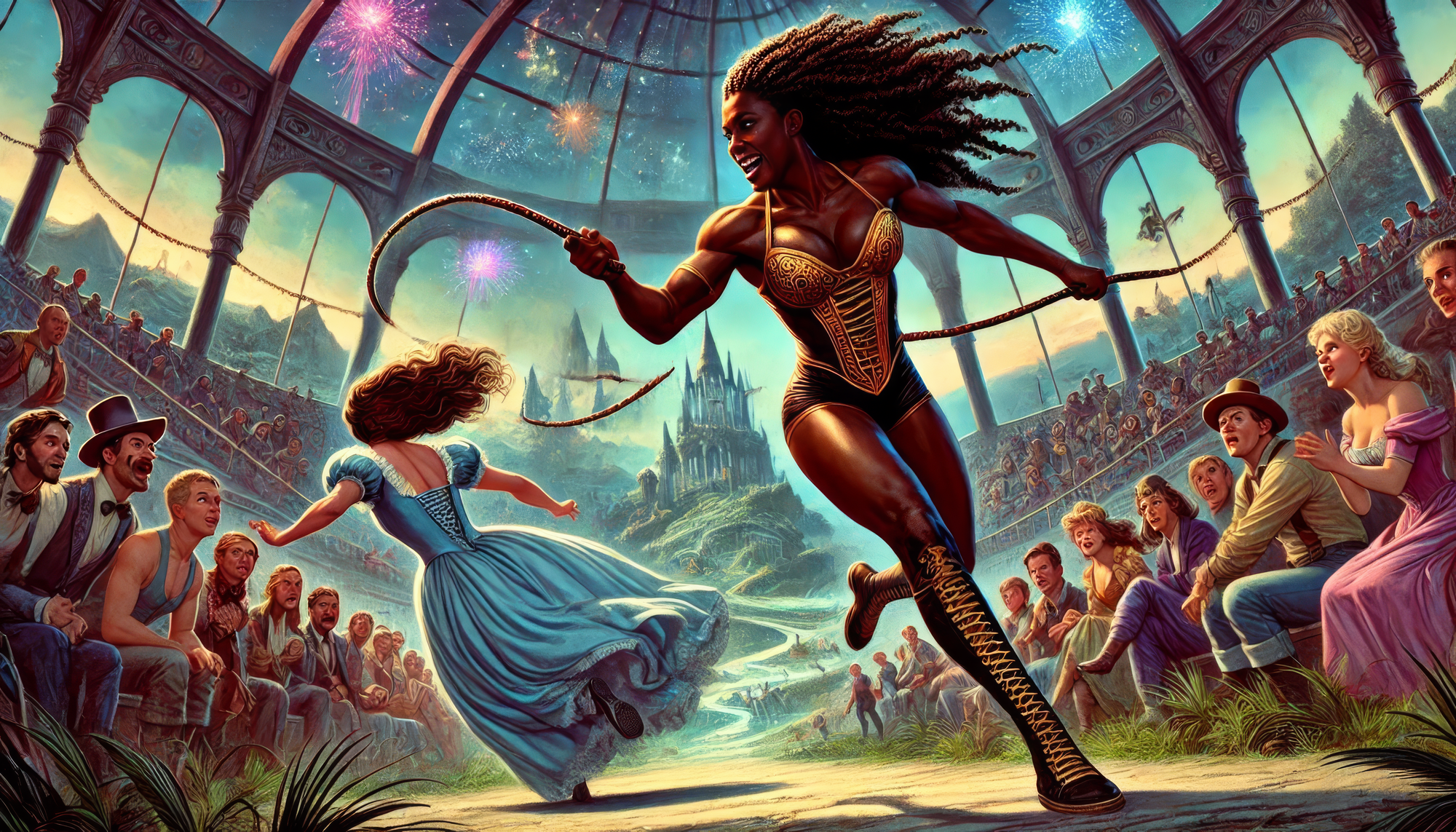
In the third match of the Soul Power Olympic Brawl, the squared circle metamorphosed into a crucible of burgeoning female prowess. "Southern Belle" Emily Beaumont, a figure swathed in an aura of aristocratic charm and magnolia-scented mystery, glided into the arena with the poise of a debutante and the cunning of a chess master to the sound of "I Fall to Pieces" by Patsy Cline. Her every gesture was a calculated move in a game of psychological warfare, designed to ensnare the hearts and minds of the assembled throng.
Standing opposite Beaumont, a study in contrast and defiance, was Lisa "Action" Jackson, a Black woman whose very presence crackled with the electricity of raw athleticism and uncompromising determination. Jackson was the embodiment of a new breed of female competitor, one who refused to be bound by the shackles of tradition or the limitations imposed by a society that had long underestimated the power and potential of women. Theirs was a battle that transcended the confines of the ring, a symbolic clash between the old guard and the vanguard, each determined to assert their dominance and lay claim to the future of the sport.
As the bell sounded, the two women engaged in a mesmerizing display of psychological gamesmanship and physical prowess. Beaumont, ever the mistress of manipulation, employed a dizzying array of mind games and technical wizardry, seeking to unsettle her opponent and lure her into a web of frustration and self-destruction. With the grace of a ballerina and the precision of a surgeon, she executed a series of maneuvers designed to test Jackson's composure and exploit any weakness in her armor.
Yet Jackson, buoyed by the unwavering support of the crowd and the fire that burned within her soul, proved an indomitable force. She countered Beaumont's cerebral assault with a relentless barrage of offense, her movements a blur of explosive energy and unyielding determination. The ring, a canvas upon which Jackson painted a masterpiece of athleticism and resilience, her every action was a surge of the boundless potential of the female spirit.
The match reached its apogee in a breathtaking post-bell confrontation, a moment of unbridled intensity that pushed both women to the limits of their endurance and resolve. As Jackson's patience finally snapped, the arena bore witness to a fierce exchange that crackled with the electricity of two titans locked in mortal combat. This climactic showdown served as a powerful reminder of the depths of passion and commitment that these women brought to their craft, a microcosm of the broader struggle for respect and recognition that defined their journey in the wrestling world.
The bout between "Southern Belle" Emily Beaumont and Lisa "Action" Jackson stood as a seminal moment in the annals of the Soul Power Olympic Brawl, a vivid illustration of the transformative power of women's wrestling. Through their artistry, athleticism, and unwavering dedication, these two warriors shattered stereotypes and redefined the very essence of what it meant to be a female competitor. Their legacy would endure long after the final bell had sounded, a shining beacon of inspiration for generations of women who dared to dream of a world where their strength, courage, and boundless potential would be celebrated on the grandest of stages.
Interview with "Southern Belle" Emily Beaumont
Interviewer: How did your privileged upbringing influence your approach and strategy in the ring, especially during your match at Soul Power Olympic Brawl against Lisa "Action" Jackson?
Emily Beaumont: Well, darlin', let me tell you, growin' up amidst the grandeur of Magnolia Hall and the refined elegance of Southern society taught me a thing or two about commandin' respect and upholdin' one's dignity. In the ring, much like in life, strategy is key, and I approached that match with Lisa Jackson with the same poise and calculation that has been instilled in me since birth. I knew that her brute force and fiery spirit would need to be tempered with a touch of finesse and a sprinkle of Southern charm. You see, a true belle always stays one step ahead, and my tactics were designed to frustrate and provoke, leadin' her to make mistakes while I remained composed and unruffled. It's the subtlety of Southern strategy, sugar, where the mind leads and the body follows.
Interviewer: Considering your persona as "The Southern Belle," how did you plan to maintain your genteel and aristocratic image during such a physically demanding and intense match?
Emily Beaumont: Ah, the key to maintainin' one's genteel image in the midst of such a rugged spectacle lies in the art of presentation and demeanor. Even in the heat of battle, a true Southern Belle never loses her composure. Throughout my match with Lisa Jackson, every move, every gesture was executed with the grace befittin' my heritage. When she attempted to overpower me with her raw aggression, I countered with elegance and precision, demonstratin' that true strength lies not in brute force but in poise and intellect. My upbringing taught me that one can engage in the fiercest of battles while still embodyin' the charm and sophistication of our esteemed lineage. It's about turnin' every maneuver into a dance, every strike into a statement of aristocratic superiority. In the end, it's that very blend of strength and elegance that sets me apart and secures my place as the quintessential Southern Belle of the GWA.
Fourth Match: The Renegade Riders vs. Big Kat Round Bellies
In the fourth match of the Soul Power Olympic Brawl, the electrifying Renegade Riders found themselves locked in a battle of wills and skill against the effervescent Big Kat Round Bellies, a confrontation that transcended the boundaries of mere athletic prowess to delve into the intricate web of team dynamics. The Renegade Riders, formerly renowned for their unbreakable bond and seamless coordination, strode into the arena separately, a palpable aura of intense friction crackling between them like a gathering storm. Their eyes, once alight with the fire of shared purpose, now bore into each other with a searing distrust, a silent testament to the unspoken tensions that threatened to tear asunder the very fabric of their partnership.
Across the expanse of the ring, the Big Kat Round Bellies stood as a vibrant counterpoint, their presence a kaleidoscope of unbridled joy and infectious camaraderie. With an exuberant energy that seemed to radiate from their very pores, they whipped the crowd into a frenzy, during their entrance. "Hang on Sloopy" by the McCoys filled the air as their playful antics and magnetic charm drew the audience into their orbit. The stage was set for a clash of contrasts, a battle that would lay bare the intricacies of cooperation and conflict that lay at the heart of tag team wrestling.
As the bell tolled, signaling the commencement of hostilities, it became abundantly clear that this match would be a crucible, a trial by fire that would test not only the physical mettle of the combatants but also the strength of the bonds that united them. The Renegade Riders, "Outlaw" Jesse Hawkins and Tommy Tucker, their once-flawless synchronicity now a distant memory, stumbled through a series of poorly executed maneuvers, their unraveling synergy painfully evident in every fumbled tag and mistimed double-team assault. The cracks in their armor, once hairline fractures, now gaped like yawning chasms, exposing the festering wounds of discord that lay beneath.
In stark contrast, the Big Kat Round Bellies moved with the fluidity of a well-oiled machine, their unorthodox blend of agility and raw power a dazzling display of controlled chaos. Punctuating their offense with moments of unadulterated spectacle, they played to the crowd with an ease born of innate charisma, their every gesture a masterclass in the art of showmanship. As the tide of battle ebbed and flowed, the fault lines within the Renegade Riders became increasingly apparent, the once-unbreakable trust between Jesse and Tommy eroding with each passing moment.
The conclusion of this gripping drama unfolded in a single, heart-stopping instant, as Roundbelly Ray and Bubba Roundbelly, seizing upon a fateful miscommunication between their foes, struck with the swiftness of a coiled serpent. Their victory, sealed amidst a cacophony of ecstatic cheers, stood as a testament not only to their own prowess but also to the inexorable unraveling of the Renegade Riders' once-legendary alliance. This moment, pregnant with the weight of impending betrayal, foreshadowed the seismic shift that would come to pass in October, when Outlaw's treachery would shatter the bond between Jesse and Tommy, irrevocably altering the landscape of the GWA.
In evaluating from today's lens, this match served as a poignant reminder of the fundamental truth that lies at the core of professional wrestling: that the dramas played out within the squared circle are, at their heart, a reflection of the complex tapestry of human relationships. In a world where trust and loyalty are the coins of the realm, a single act of betrayal can carry the weight of a thousand physical blows, forever altering the course of destinies both inside and outside the ring. The Soul Power Olympic Brawl had borne witness to a morality play writ large, a tale of brotherhood and betrayal that would echo through the annals of wrestling lore for generations to come.
Interview with Jesse "The Outlaw" Hawkins
Interviewer: Jesse, your match at Soul Power Olympic Brawl against the Big Kat Round Bellies was a turning point for the Renegade Riders. With the recent passing of your partner Tommy Tucker, how do you reflect on that night and the bond you shared in the ring?
Jesse "The Outlaw" Hawkins: You know, partner, that night at Soul Power was like ridin' a unbusted bronco. Me and Tommy, we had our ups and downs, but we always rode hard and stayed true to the game. Standin' in that ring, feelin' the crowd's energy, it was like the whole world was watchin' two outlaws carve up their own legacy. I'm thankful we got make amends and rebuild it. With Tommy gone now, it hits different. That night, when we faced the Big Kat Round Bellies, I knew the cracks were breakin' apart, but I also saw the strength that Tommy and I built together. He was more than a partner; he was a brother in arms. Reflectin' on it now, I realize every match, every move was part of a bigger story—our story. And even though he's gone, his spirit will ride with me every time I step into that squared circle.
Interviewer: Given your transition from being seen as a heel to a respected veteran, how do you reconcile your rugged persona with the emotions you're experiencing since Tommy's passing?
Jesse "The Outlaw" Hawkins: Life's a tough trail, and I've ridden through my share of storms. My rugged persona, that no-nonsense, take-no-prisoners attitude—that's always been my armor, my way of facin' the world head-on. But losin' Tommy, it puts things into a new perspective. It ain't just about the fights and the titles; it's about the connections we make, the moments we share. When I'm step back in that ring, there'll be a part of me fightin' for him, for what we built together. The emotions, they ain't a sign of weakness—they're a testament to the journey we've had. You see, strength ain't just about the muscles and the moves; it's about the heart, the soul behind every punch. Tommy's passing continues to teach me that bein' tough ain't just about never fallin'—it's about gettin' back up, with more resolve and a deeper sense of purpose. So, when I lace up my boots and put on that hat, I carry his memory with me, and that makes every battle a tribute to the man, the myth, and the legend we created together.
Fifth Match: Eddie "Desert Eagle" Martinez vs. "The Technician" Thomas Reed
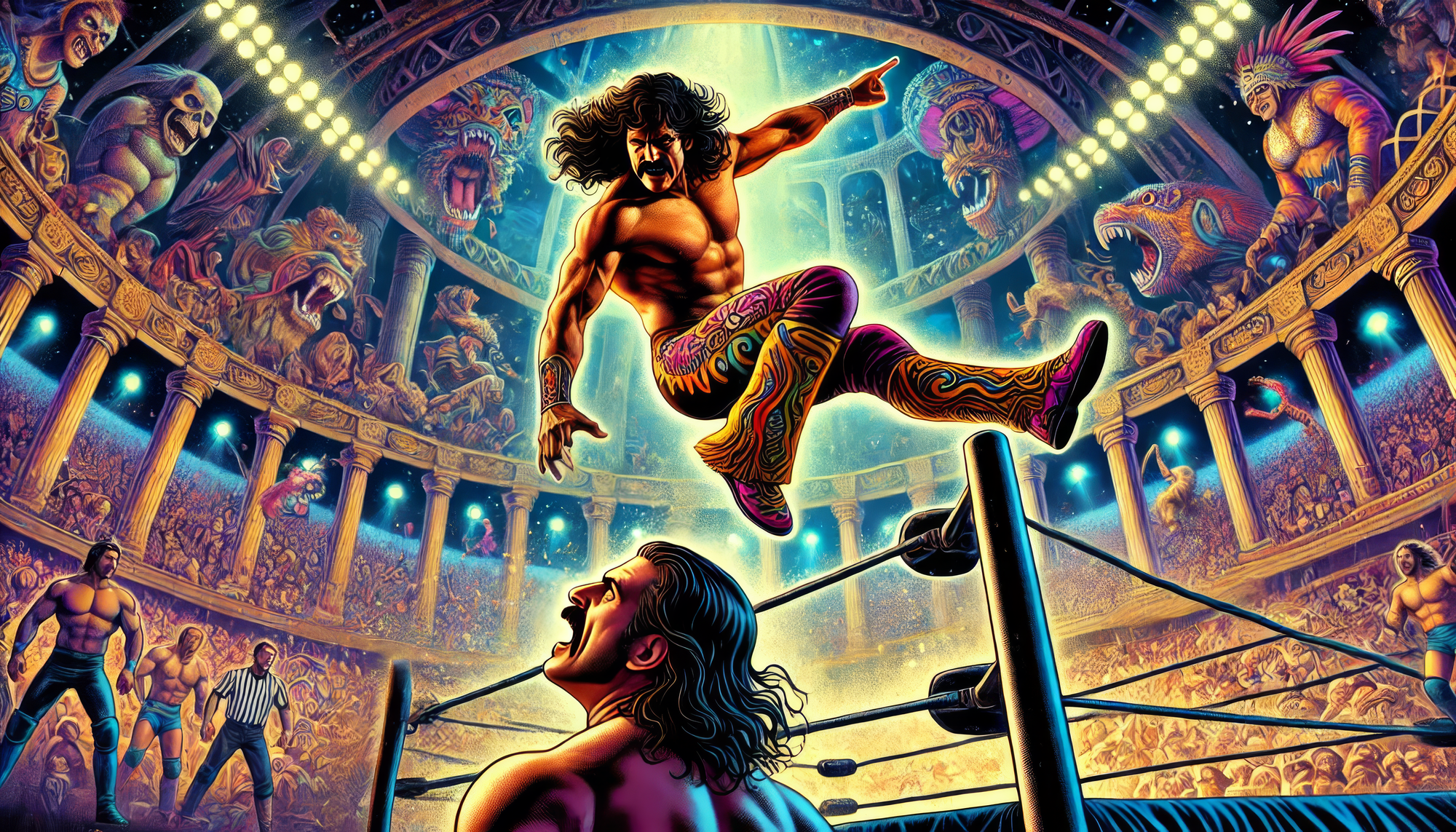
The fifth match of the Soul Power Olympic Brawl unfolded as a mesmerizing chess game brought to life, a cerebral duel that saw Eddie "Desert Eagle" Martinez, a high-flying virtuoso, pitted against the meticulous mastermind Canadian known as "The Technician" Thomas Reed. Martinez, a supernova of explosive agility and magnetic charisma, burst into the arena accompanied by the electrifying strains of Daddy Cool's "Eagle Rock," his very presence igniting the crowd with a palpable surge of energy. In diametric opposition stood Reed, an avatar of cold precision, his entrance heralded by the ominous notes of The Guess Who's "No Time," a fitting overture for a wrestler renowned for dissecting his opponents with surgical efficiency. The anticipation that hung heavy in the air was not merely a product of the impending physical clash but a reflection of the deeper narrative that underpinned this encounter—a philosophical battle between the dazzling spectacle of style and the unyielding substance of technical prowess.
As the bell tolled, signaling the commencement of hostilities, the match unfolded as a scintillating tapestry of speed and strategy, each thread a testament to the unique skills of the combatants. Martinez, a quicksilver blur of motion, unleashed a dizzying array of rapid-fire dropkicks and aerial assaults, each death-defying maneuver a calculated gambit that paid dividends in the form of the crowd's thunderous approbation. Reed, an implacable force of nature, weathered the storm of Martinez's offense with the stoic resolve of a chess master, methodically grounding his opponent with a series of expertly applied holds and suplexes, each move a devastating display of his technical supremacy.
Back and forth the pendulum of control swung, the momentum shifting with the inexorable rhythm of the tides. Martinez, a human projectile fueled by the roar of the crowd, electrified the arena with a spectacular flying body press and a missile dropkick that seemed to defy the very laws of gravity. Reed, an immovable object to Martinez's irresistible force, countered with a punishing backbreaker and an abdominal stretch that showcased the depth of his grappling repertoire, each hold demonstrating his ability to nullify his opponent's offense and impose his will upon the match.
The end of this epic struggle was a moment of pure, unadulterated spectacle, a climax that will forever be etched in the annals of wrestling lore. Martinez, summoning the very essence of his athletic brilliance, ascended to the top rope, a silhouette against the glaring lights, before launching himself into the void with a breathtaking missile dropkick that seemed to hang suspended in time. The impact, when it came, was seismic, a collision of two indomitable forces that sent shockwaves rippling through the arena. In that instant, as Martinez followed up with a sunset flip that secured the pinfall, the crowd erupted in a cacophony of euphoria, their voices rising in a collective roar of triumph and adulation.
The aftermath of the match was a scene of unexpected grace, a moment that encapsulated the true spirit of sportsmanship that lies at the heart of the wrestling craft. Reed, ever the consummate professional, extended his hand in a gesture of respect, a silent acknowledgment of the warrior's code that binds all those who step into the squared circle. Martinez, his chest heaving with the exertion of victory, clasped Reed's hand in his own, a solemn compact forged in the crucible of combat, a bond that transcended the enmity of mere competition.
In the final analysis, the clash between Eddie "Desert Eagle" Martinez and "The Technician" Thomas Reed stood as a shining example of the heights to which the art of wrestling can soar when two masters of the craft come together in a dance of skill, strategy, and sheer, unbridled passion. Theirs was a battle that will be spoken of in reverent tones for generations to come, a testament to the enduring power of the human spirit and the timeless magic of the squared circle.
Interview with Eddie "Desert Eagle" Martinez
Interviewer: Eddie, what was your reaction when you secured the victory with the missile dropkick and sunset flip?
Eddie "Desert Eagle" Martinez: Man, when I hit that missile dropkick and felt the impact, it was like I was flying higher than ever before. And then, to follow it up with the sunset flip, catching Reed off guard—well, let me tell you, it was a moment I'll never forget. As soon as I felt the ref's hand hit the mat for the three-count, a rush of emotion came over me. It was more than just a win; it was a culmination of all the hard work, the sweat, and the dreams I carried from Ventura County into that ring. You see, every time I step into that squared circle, I'm not just fighting for myself—I'm fighting for my family, my community, and every kid out there who dares to dream. That victory was an example of the power of perseverance and heart, and it made me feel like all the struggles were worth it.
Interviewer: How did the crowd's reaction enhance your performance that night?
Eddie "Desert Eagle" Martinez: The crowd that night, man, they were electric. From the moment I stepped out to "Eagle Rock" and heard their cheers, I felt an energy that was indescribable. Every move I made, every hit I took, their voices were like a wave lifting me higher. When they chanted my name, it was like a heartbeat, it felt like they were beating with me. Their support gave me that extra push, that extra fire to dig deeper and fight harder. You know, wrestling isn't just about physical strength; it's about the connection with the fans. Their energy, their passion—it fuels us, it drives us to be better, to give everything we've got. That night, their reaction was a reminder that we're all in this together, and their love and support made that victory even sweeter. It's moments like these that show the true spirit of lucha libre, where the fans and the wrestlers are united in celebration and pride.
Final Match: James "Harlem Hurricane" Washington vs. "The Gentleman" James Montgomery
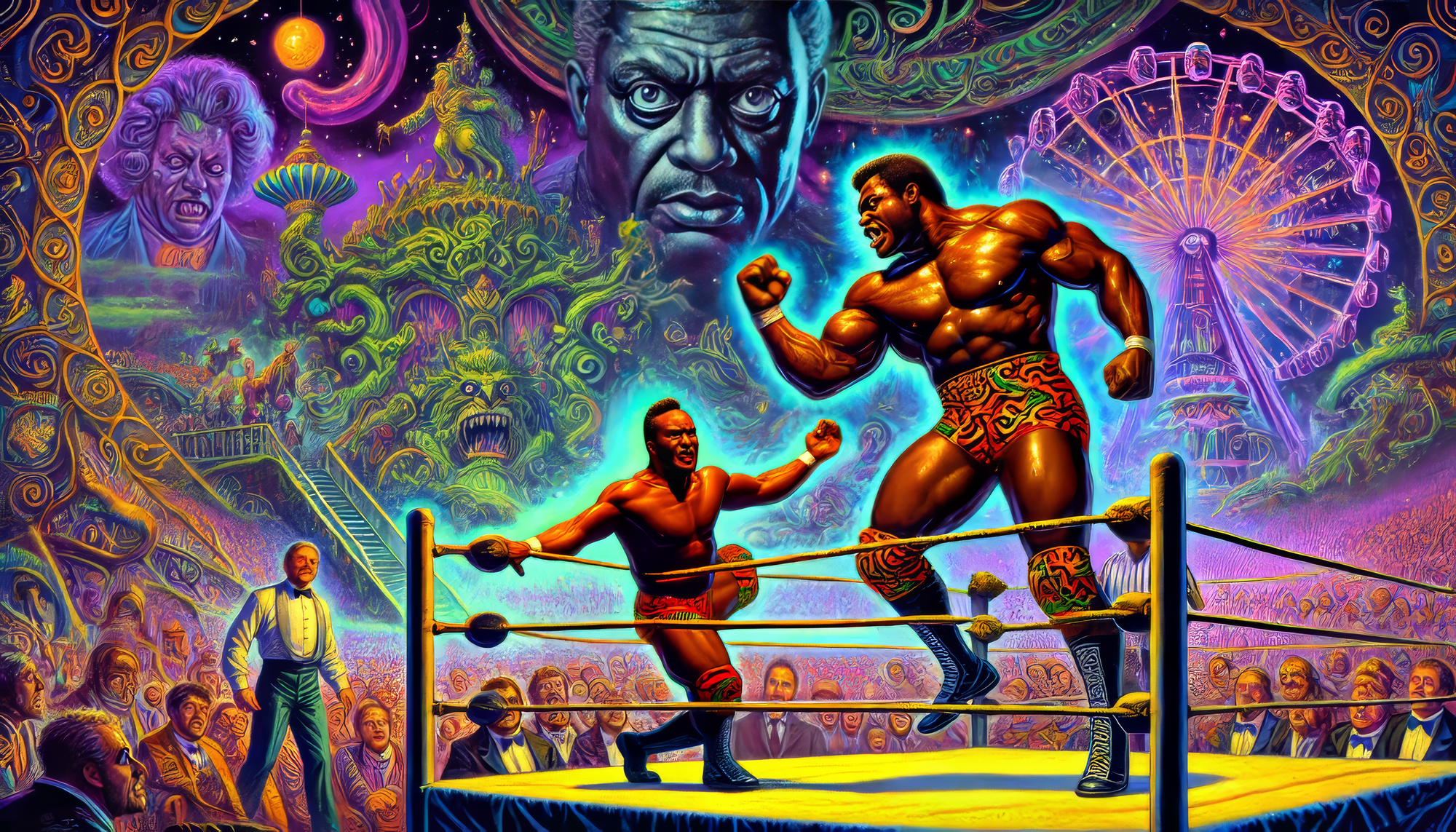
The grand finale of the Soul Power Olympic Brawl was a spectacle that transcended the boundaries of sport, embodying the cultural zeitgeist and the indomitable spirit of an era. As "Harlem Hurricane" James Washington made his entrance, the arena was set ablaze with an electric anticipation, the very air crackling with the promise of a moment that would be forever etched in the annals of wrestling history. Washington, a living embodiment of resilience and determination, strode towards the ring accompanied by the soul-stirring strains of "It's Your Thing" by The Isley Brothers, the anthem's lyrics a clarion call to self-empowerment and unbridled expression. Clad in the vibrant hues of Harlem, a palette that spoke to the rich tapestry of his heritage, Washington's presence was a beacon of hope and pride, his every step a declaration of his unbreakable spirit.
Across the expanse of the ring stood "The Gentleman" James Montgomery, a figure cast in the mold of aristocratic disdain, his very essence a stark counterpoint to the ideals and aspirations that Washington represented. As Montgomery made his entrance, shrouded in the discordant strains of "I Wish I Were In Dixie," the crowd's boos and jeers rose to a deafening crescendo, a cacophony of righteous indignation that spoke to the simmering tensions and deep-seated yearnings of a society on the brink of transformation. Flanked by an imposing phalanx of police protection, Montgomery's presence was a jarring reminder of the entrenched power structures and systemic inequities that the Soul Power Olympic Brawl sought to challenge and overturn.
As the bell sounded, the two warriors collided in a maelstrom of sweat and determination, their bodies a blur of motion as they vied for dominance in a battle that transcended mere athletics. Washington, fueled by the love and support of his community, unleashed a blistering offensive that was as much a testament to his unwavering spirit as it was to his physical prowess. With each move, each acrobatic feat of agility and strength, he channeled the hopes and dreams of a generation, his very essence a living embodiment of the unbreakable bonds of family, friends, and the indomitable will to overcome.
Montgomery, a master of psychological warfare, sought to undermine Washington's resolve with a calculated onslaught of technical precision and underhanded tactics. Each hold and counter-hold was a twisted reflection of the societal barriers and prejudices that Washington and his community faced daily, a physical manifestation of the forces that sought to keep them down and deny them their rightful place in the sun.
But Washington, with the roar of the crowd at his back and the fire of determination burning in his heart, would not be denied. In a moment that will forever be seared into the collective memory of all who bore witness, he caught his opponent in his signature submission move, the 'Eye of the Hurricane,' a devastating maneuver that embodied the unleashed potential and righteous fury of a people too long held down. As Montgomery, trapped in the eye of the storm, tapped out in desperation, the auditorium exploded in a cathartic release of joy and vindication, the very foundations of the building shaking with the force of a community's unbridled elation.
In the aftermath of his triumph, Washington, his eyes glistening with the raw emotion of the moment, paid heartfelt tribute to his late grandmother Ophelia, the woman who had been his rock, his guiding light, and his ultimate inspiration. As he spoke of her love, her sacrifice, and her unshakable belief in him, there was not a dry eye in the house, the audience united in a shared moment of grief, gratitude, and unbridled love.
Interview with "Harlem Hurricane" James Washington
Interviewer: James, what was going through your mind during your victory over "The Gentleman" James Montgomery?
Harlem Hurricane: You know, stepping into that ring with Montgomery, I carried more than just my own hopes and dreams. I had the weight of Harlem, the lessons of my beloved Grandma Ophelia, and the spirit of every young soul lookin' up to me. When the final moments came, and I had him locked in the 'Eye of the Hurricane,' my mind was a whirlwind of emotions. I thought about every struggle, every sacrifice that got me to that point. I remembered the faces of kids around the world who needed to see that someone from their streets could rise to greatness. As Montgomery tapped out, it wasn't only a victory for me—it was a victory for everyone who's ever been told they couldn't make it. I felt the triumph of hard work, the validation of my principles, and the immense pride of representing my peoples. In that moment, I was no longer James Washington; I was the Harlem Hurricane, a force of nature, a beacon of hope, and a testament to the power of perseverance and positivity.
Interviewer: How did the energy from the crowd influence your performance that night?
Harlem Hurricane: Oh man, the energy in that auditorium was electric, like a jazz band hittin' its peak on a hot summer night. From the moment I stepped out to "It's Your Thing," the crowd's love and support wrapped around me like a warm embrace from Grandma Ophelia herself. Every cheer, every chant of "Harlem Hurricane," it was like a rhythm that pushed me forward, beatin' in sync with my heart. The crowd's energy wasn't just fuel—it was a lifeline, remindin' me why I fight, why I give my all. It turned every move into a dance, every strike into a statement. When I felt their spirit liftin' me up, I knew there was no way I could let them down. It wasn't just me in that ring; it was all of us, united in a shared dream of victory and excellence. Their belief in me gave me the strength to dig deeper, to fight harder, and to rise above. The crowd wasn't just watchin' a match; they were part of it, and together, we created a moment that will resonate through time.
Conclusion
As the final echoes of the Soul Power Olympic Brawl reverberated through the Grand Olympic Auditorium, a palpable sense of awe hung in the air. The night had been a tapestry of unforgettable moments, each match a vivid chapter in the annals of wrestling history. The heroes and villains, the triumphs and heartaches, had all coalesced into an event that transcended the boundaries of mere sports entertainment. This was more than wrestling; it was a cultural phenomenon, a beacon of unity, and a testament to the enduring power of the human spirit.
The Soul Power Olympic Brawl was a masterful symphony of soul and strength, where the pulse of the music intertwined with the rhythm of the wrestlers' hearts. From Vic Steele's cunning victory to Pedro Ramirez's soaring triumph, from Emily Beaumont's poised battle to the Renegade Riders' poignant drama, each bout had been a story unto itself, woven with threads of passion, resilience, and raw emotion.
James "Harlem Hurricane" Washington's victory was the crowning jewel of the night, a powerful symbol of hope and perseverance that resonated far beyond the confines of the ring. His triumph was a reminder that no matter the odds, no matter the obstacles, the human spirit is indomitable. It was a moment that united a community, a testament to the power of dreams and the strength of belief.
As the lights dimmed and the crowd slowly dispersed, the memories of this legendary night lingered, etched into the hearts and minds of all who had borne witness. The Soul Power Olympic Brawl had not just been an event; it had been an experience, a moment in time that would inspire generations to come. It was a night that reminded us all of the power of unity, the beauty of diversity, and the unbreakable bonds that connect us all.
In the grand tapestry of wrestling history, the Soul Power Olympic Brawl stands as a luminous thread, a beacon of what the sport can achieve when heart, soul, and spirit collide. As we reflect on this extraordinary night, we are left yearning for more, eager to witness the next chapter in this epic saga of strength, courage, and unity. The legacy of the Soul Power Olympic Brawl endures, a shining example of the magic that happens when the world of wrestling embraces the power of soul.



